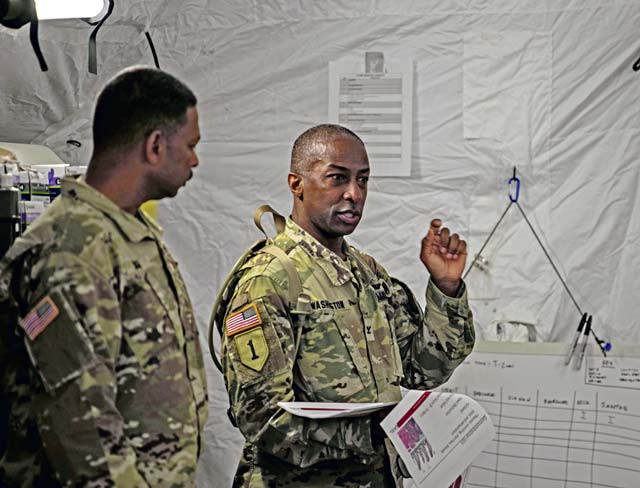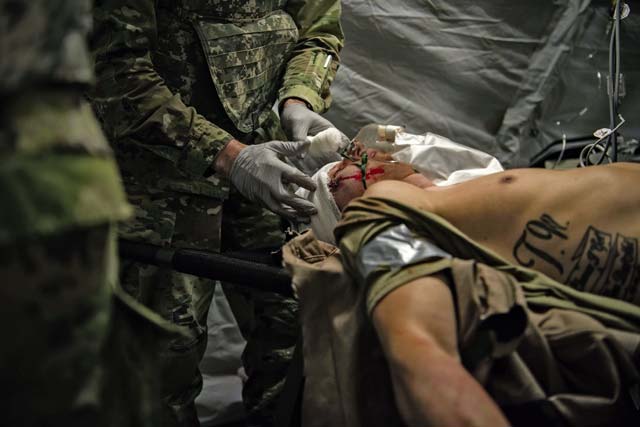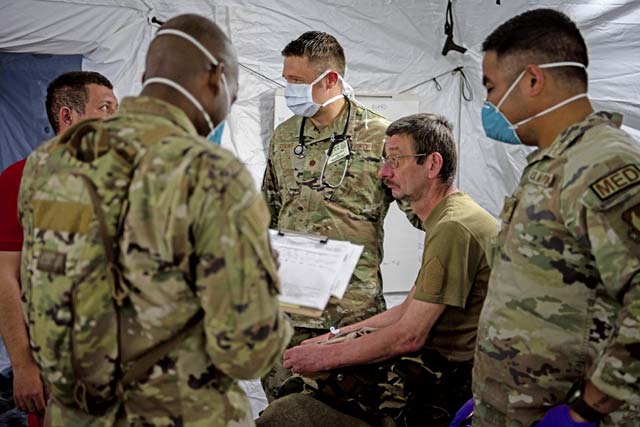
BAKONYKúTI TRAINING AREA, HUNGARY – A U.S. contingent of 50 personnel participated in Vigorous Warrior 24 May 3-8, at Bakonykúti Training Area, Hungary.
Vigorous Warrior is NATO’s largest medical exercise, with this iteration uniting more than 1,600 participants from 33 countries to exercise experimental doctrinal concepts and test their medical assets together in a dynamic, multinational environment.
Training opportunities such as VW24 allow U.S. service members to interact and operate alongside NATO Allies and partners, bolstering relationships and helping to solidify tactics to better prepare NATO’s medical community as a whole for responses to crises and contingencies.
“It really helps to demonstrate NATO’s resoluteness as an alliance,” said Col. Steven Lehr, U.S. Air Forces Europe – Air Forces Africa command surgeon. “If you look at VW and the commitment by the partners out here, there is no better demonstration of how strong we are when we go together.”

The primary U.S. Air Force presence incorporated medics in a range of specialties from the 86th Medical Group and Landstuhl Regional Medical Center.
Together with representation from the U.S. Army, Belgian Armed Forces and Slovakian Armed Forces, the group erected and operated a Role 2 Enhanced Expeditionary Medical Support System. The configuration included command and control, an emergency room, an intensive care unit, an operating room, and an outbound patient area, with additional support for pediatric care, women’s health practices, veterinary care, dentistry and pharmacy.
“This is the facility we would expect to operate in a contested environment,” said Staff Sgt. Jet Olonan, 86th MDG Flight and Operational Medicine medical technician. “We can arrive on scene, be fully functional within 12 hours, and be able to triage a population at risk of up to 3,000.”

The foremost objectives of VW24 were to plan and manage the continuity of medical care in a NATO article V scenario, exercise a complex medical structure able to handle large numbers of casualties and test patient tracking procedures in a mult-inational joint en-viron-ment.
The U.S. Air Forces in Europe and Air Forces Africa Surgeon General plans office enhanced training opportunities during the exercise by incorporating additional injects to further test the EMEDS capabilities and target U.S.-specific goals.
“Ultimately, the goal is to provide as realistic training as possible. We contributed to that with our high-fidelity casualty simulators,” said Staff Sgt. Alyssa Haskew-Smith, 86th Healthcare Operations Squadron noncommissioned officer in charge of readiness training. “By incorporating these scenarios we amplify the level of care that our medics need to exercise while fueling the operations tempo to create a more stressful environment.”
Between exercise-led and internal injects, the training audience encountered 143 casualties. Patient injuries ranged from dog bites and simple ailments to traumatic brain injuries and amputations.
“The variety of injuries we see during these exercises prepares us for many of the things we can expect to see during a real-world medical response,” said Chief Master Sgt. Tyler Meyenburg, 86th MDG senior enlisted leader. “It’s impossible to predict everything, so we try to be ready for anything within our scope of medical care capabilities.”
Additional breakout sessions alongside training audiences from Spain, Belgium and Canada allowed for cross-sharing of knowledge which will reinforce lessons learned and can be used to complement U.S. medical skill sets.
“Watching our partner nations come together was a great opportunity for us to learn from them and them from us,” said Col. Dwayne Baca, 86th MDG commander. “I’m very proud of our medics as they come out here and showcase what they do every day.”


